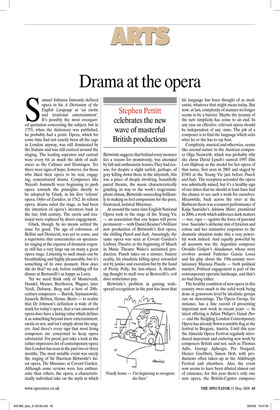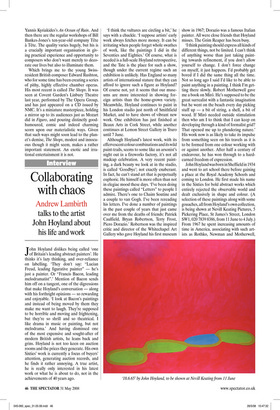Drama at the opera
Stephen Pettitt celebrates the new wave of masterful British productions
Samuel Johnson famously defined opera in his A Dictionary of the English Language as ‘an exotic and irrational entertainment’. It’s possibly the most overquoted quotation concerning the subject, but in 1755, when the dictionary was published, he probably had a point. Opera, which for some time had not exactly been all the rage in London anyway, was still dominated by the Italians and was still centred around the singing. The leading sopranos and castrati were every bit as much the idols of audiences as the Callases and Domingos. Yet there were signs of hope, however, for those who liked their opera to be real, engaging, concentrated drama. Composers like Niccolò Jommelli were beginning to push opera towards the principles shortly to be adopted by Gluck, in his first ‘reform’ opera, Orfeo ed Euridice, in 1762. In reform opera, drama ruled the stage, as had been the intention of opera’s inventors back in the late 16th century. The exotic and irrational were replaced by direct engagement.
Gluck, though, by no means settled the issue for good. The age of coloratura, of Bellini and Donizetti, was yet to come, and a repertoire that concentrates on spectacular singing at the expense of dramatic cogency still has a very large say on many a great opera stage. Listening to such music can be breathtaking and highly pleasurable, but it’s something of its own moment. How does she do that? we ask, before toddling off for dinner at Bertorelli’s as happy as Larry.
Yet we need think only of Monteverdi, Handel, Mozart, Beethoven, Wagner, later Verdi, Debussy, Berg and a host of 20thcentury composers — Bartok, Szymanowski, Janacek, Britten, Henze, Berio — to realise that Dr Johnson’s definition is wide of the mark for today’s opera, that a vast amount of opera does have a lasting value which defines it as something beyond mere entertainment, exotic or not, and isn’t simply about the singers. And there’s every sign that most living composers are concerned to keep opera substantial. For proof, just take a look at the rather impressive list of contemporary opera that London has seen in the past two or three months. The most notable event was surely the staging of Sir Harrison Birtwistle’s latest opera, The Minotaur, at Covent Garden. Although some reviews were less enthusiastic than others, the opera, a characteristically individual take on the myth in which Birtwistle suggests that behind every monster lies a reason for monstrosity, was attended by full and enthusiastic houses.They had reason, for despite a slight surfeit, perhaps, of gory killing down there in the labyrinth, this was a piece of deeply involving, beautifully paced theatre, the music characteristically grinding its way to the work’s tragi-triumphant climax, Birtwistle succeeding brilliantly in making us feel compassion for the poor, frustrated, isolated Minotaur.
At around the same time English National Opera took to the stage of the Young Vic — an association that one hopes will prove permanent — with Daniel Kramer’s brilliant new production of Birtwistle’s first opera, the chilling Punch and Judy. Amazingly, the same opera was seen at Covent Garden’s Linbury Theatre at the beginning of March in Music Theatre Wales’s acclaimed production. Punch takes on a sinister, bizarre reality, his ritualistic killing spree rewarded not by justice and execution but by the hand of Pretty Polly, his lust-object. A disturbing thought to mull over at Bertorelli’s: evil does sometimes pay.
Birtwistle’s problem in gaining widespread recognition in the past has been that his language has been thought of as modernist, whatever that might mean today. But now, at last, complexity of manner no longer seems to be a barrier. Maybe the tyranny of the new simplicity has come to an end. In any case an effective, relevant opera should be independent of any -isms. The job of a composer is to find the language which suits what he or she has to say best.
Complexity, musical and otherwise, seems like second nature to the Austrian composer Olga Neuwirth, which was probably why she chose David Lynch’s surreal 1997 film Lost Highway as the model for her opera of that name, first seen in 2003 and staged by ENO at the Young Vic just before Punch and Judy. The reception accorded the opera was admittedly mixed, but it’s a healthy sign of our times that we should at least have had the chance to see such a work for ourselves. Meanwhile, back across the river at the Barbican there was a concert performance of Kaija Saariaho’s Adriana Mater, premièred in 2006, a work which addresses dark matters — war, rape — against the force of parental love. Saariaho’s alchemic mix of lyricism and colour and her instinctive responses to the dramatic situation make this a very powerful work indeed. And equally powerful by all accounts was the Argentine composer Osvaldo Golijov’s Ainadamar, whose story revolves around Federico Garcia Lorca and his play about the 19th-century revolutionary Mariana Pineda — both political martyrs. Political engagement is part of the contemporary operatic landscape, and that’s no bad thing either.
The healthy condition of new opera in this country owes much to the solid work being done at grassroots level by idealistic groups run on shoestrings. The Opera Group, for instance, has a fine record of presenting important new work in recent years — its latest offering is Julian Philips’s Varjak Paw — and the fledgling London Contemporary Opera has already flown a notable flag at the festival in Bregenz, Austria. Until this year the Almeida Opera Festival regularly introduced important and enduring new work by composers British and not, such as Thomas Adès, George Aphergis, Per Norgard, Heiner Goebbels, Simon Holt, with productions often taken up at the Aldeburgh Festival and elsewhere. Alas, the event now seems to have been diluted almost out of existence, for this year there’s only one new opera, the British-Cypriot composer Yannis Kyriakides’s An Ocean of Rain. And then there are the regular workshops of Bill Bankes-Jones’s ten-year-old company Tête à Tête. The quality varies hugely, but his is a crucially important organisation in giving practical experience and opportunity to composers who don’t want merely to decorate our lives but also to illuminate them.
Which brings me to the young Swissresident British composer Edward Rushton, who for some time has been creating a series of pithy, highly effective chamber operas. His most recent is called The Shops. It was seen at Covent Garden’s Linbury Theatre last year, performed by The Opera Group, and has just appeared on a CD issued by NMC. It’s a miniature masterpiece, holding a mirror up to its audiences just as Mozart did in Figaro, and pouring distinctly goodhumoured, comic and indeed charming scorn upon our materialistic ways. Given that such ways might soon lead to the planet’s demise, The Shops, modest and innocuous though it might seem, makes a rather important statement. An exotic and irrational entertainment it is not.











































































 Previous page
Previous page